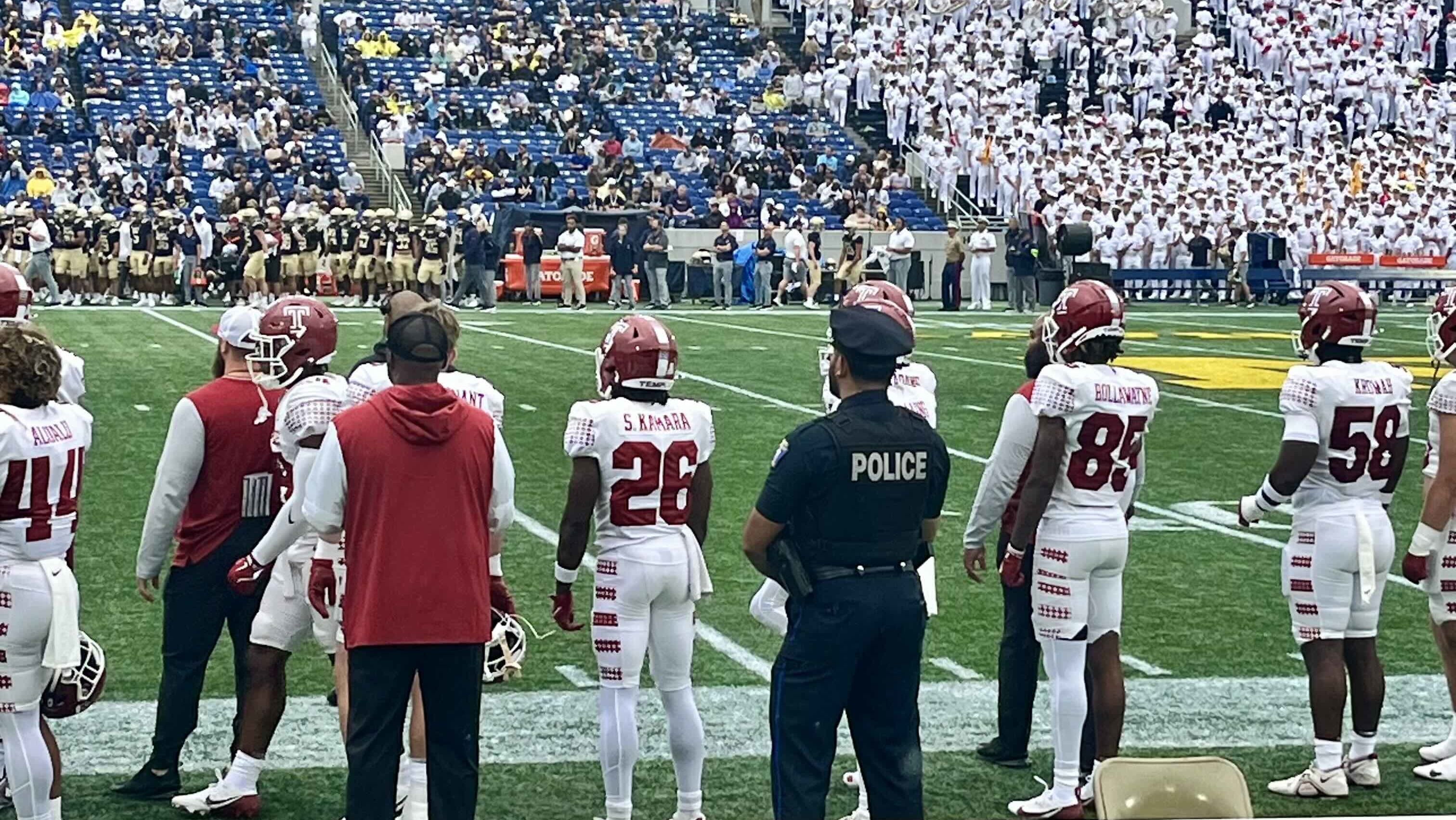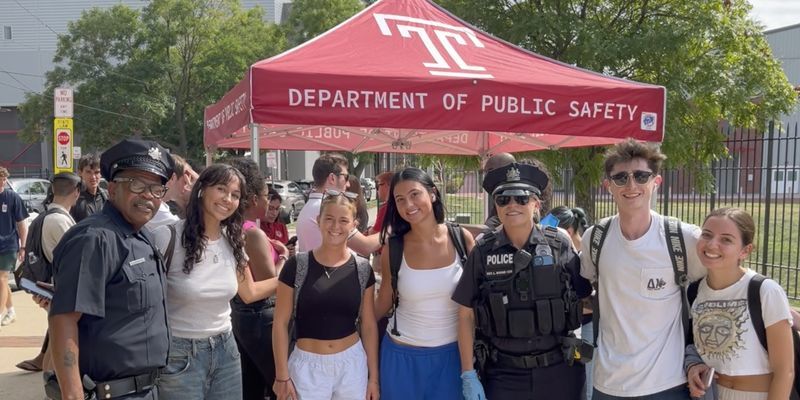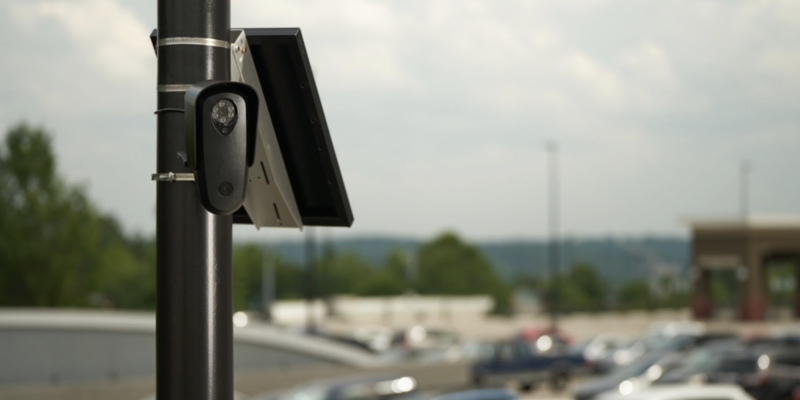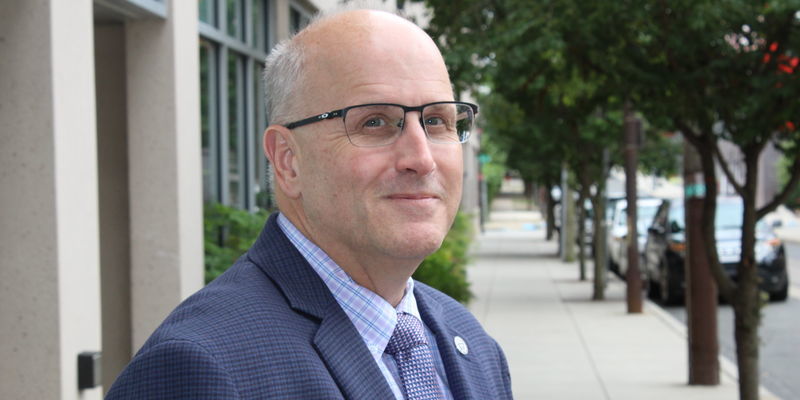An inside look at dignitary protection provided by Temple Police
Vice President for Public Safety Jennifer Griffin says Temple police officers traveling with the Owls allows the university to better connect with authorities in local jurisdictions.

As the Owls prepared to take on Navy during an away game in Maryland, Temple Police Officer Arashdeep Bawa stood tall on the sidelines, patrolling near Head Coach Stan Drayton and the rest of the team. Officer Bawa is one of several Temple police officers on rotation who provide dignitary protection for the Owls at every game, whether they are playing at home or on the road.
“My main assignment is to provide dignitary protection and to be a liaison for the team,” Bawa said. “Part of that is asking the coach if he has concerns, making connections with local law enforcement as needed and making rounds when the team is together at their hotel.”
The dignitary unit within Temple University’s Department of Public Safety helps to coordinate all aspects of protective security details with the team.
“When Temple police officers travel with the Owls, it allows the university to better connect with the police in local jurisdictions while also providing peace of mind to the players and coaches,” said Temple’s Police Chief and Vice President for Public Safety Jennifer Griffin. “When you think about our Division I football team, you have to have someone to be that buffer. A uniformed police officer, someone who the team is a familiar face with, is able to do just that, if needed.”
Arthur Johnson, vice president and athletic director of the Temple Owls, said the team appreciates the presence and dedication of Temple police officers at their games.
“It allows our players to see police in a different light,” Johnson said. “They eat meals together when we’re on the road and they have the chance to interact and talk with each other in a more casual way. They talk about their careers, about the law and it helps to build a bridge between police and our student-athletes.”
The interactions can also lead to out-of-classroom learning opportunities for student-athletes, Johnson said.
“Our athletes sometimes have some really frank discussions about the interactions that may have taken place between law enforcement and civilians. They can also learn about the career of being in uniform, so it’s a great experience for them,” Johnson said.
“I like to build a rapport with the team,” Bawa said. “It’s important because when we go back on campus, I want our student-athletes to know that they can be comfortable to contact us at Temple Police if they ever need anything.”
Officer Bawa said that he also enjoys his police duties during the games.
“It’s an amazing experience to watch our Owls play up close and personal,” Bawa said. “Standing right next to the coach, it’s a feeling like nothing I’ve experienced before. While I’m on duty, I’m also watching the play-by-play and the calls get made. It’s really exciting. I didn’t know how much goes into it until I was there.”
Bawa added, “While the coach definitely carries a high profile, he is very inviting, professional and easy to get along with.”
Before games, coaches show the highlight videos and deliver motivational speeches to the players.
“I love hearing the coaches talk to their team. They’re so inspiring and motivating and I’m thinking, ‘Get me some pads and a helmet, I’ll go in, too, coach!’” Bawa said.
In addition to police, the Owls also have a medical team consisting of two doctors who travel to away games. Donors may travel at times, as well, to see what happens behind the scenes.
Johnson also said the presence of law enforcement can help deter potential situations from happening.
“The most important part of the protection is to make sure you have someone with you in case you have an incident,” Johnson said.
“It’s very important work because when we are there on duty, we need to make sure that the coach, his staff and team are safer. It’s very rewarding,” Bawa said, adding he also enjoys meeting police from other jurisdictions.


